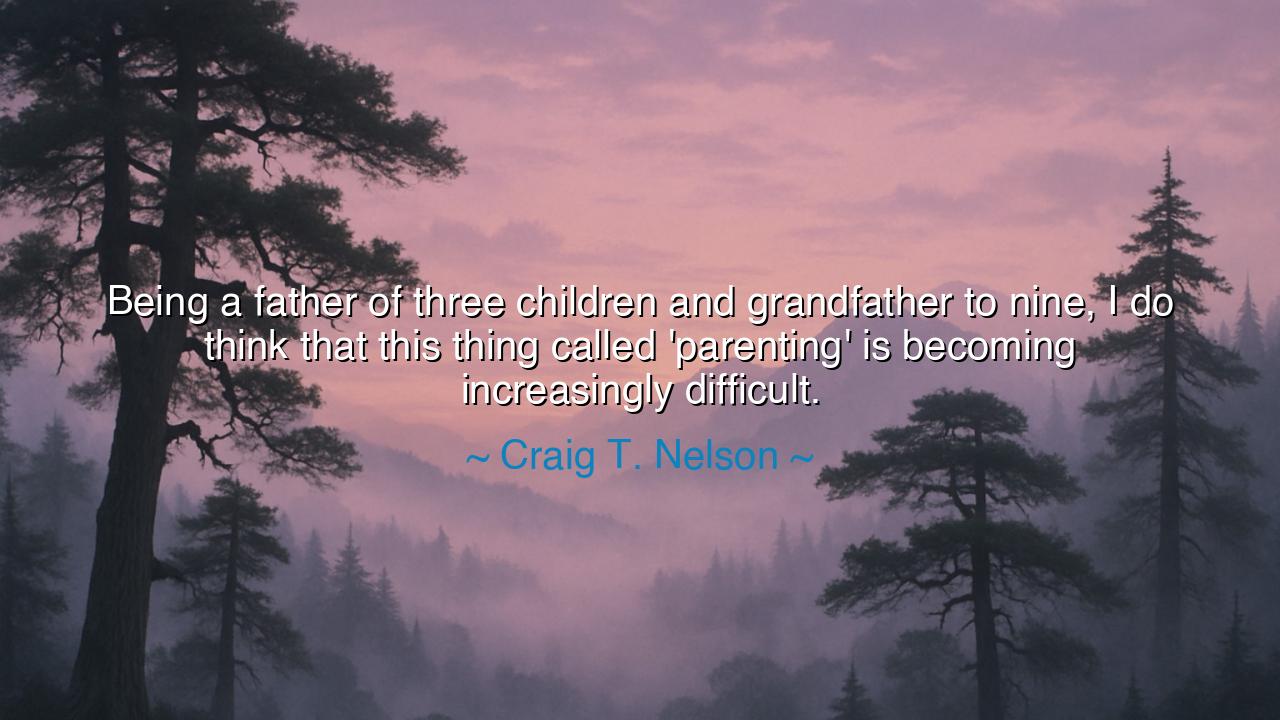
Being a father of three children and grandfather to nine, I do
Being a father of three children and grandfather to nine, I do think that this thing called 'parenting' is becoming increasingly difficult.






Hear the voice of Craig T. Nelson, who speaks not only as an actor but as a father and grandfather, seasoned by the years: “Being a father of three children and grandfather to nine, I do think that this thing called ‘parenting’ is becoming increasingly difficult.” These words carry the weight of generations, for they come not from one who looks upon parenting from afar, but from one who has walked its long road, first as a father in his own time, and then as a witness to his children raising children. His words are a testimony: that while the essence of love remains unchanged, the labor of parenting grows heavier as the world itself grows more complex.
In ages past, raising children was always a trial, but the challenges were different. Parents labored to feed, clothe, and protect their children from hunger, disease, and the dangers of a harsh world. Yet as the centuries turned, those trials shifted. In many lands, survival was no longer the only task; now parents face the ceaseless noise of technology, the chaos of changing values, and the constant judgment of a society that watches every choice. Thus Nelson, looking across decades, sees clearly that each generation faces harder questions, more distractions, and greater pressures than the one before.
The phrase “increasingly difficult” speaks not only to the changing world but to the burden of expectation. Today, parents are told they must be everything: protectors, teachers, entertainers, psychologists, and moral guides. They are urged to raise children who are not only safe and healthy, but also confident, creative, socially adept, and successful in a world that never stops moving. Where once the parent’s task was survival, now it is perfection—and perfection is a crueler master than hunger itself. Nelson’s words remind us that difficulty lies not only in the child’s need but in the weight of society’s demands.
History itself reveals this truth. Consider the story of the Industrial Revolution. Before its rise, families worked the land together, children learning directly from parents, life harsh but simple. With the factories came urbanization, separation, and new dangers. Parents now had to guard against not only illness but also corruption, exploitation, and the loss of family unity. Each new age brings its trials, and each generation of parents must learn anew how to guide their children through unfamiliar storms. Nelson, as both father and grandfather, sees this long arc, and names it plainly: parenting does not grow easier—it grows harder.
And yet, within his words there is not despair, but realism. For the difficulty of parenting is also the measure of its greatness. No other task demands such endurance, such adaptability, such courage of heart. The parent is asked to face not only their own trials, but to prepare a child to meet a future they themselves cannot see. To call this “increasingly difficult” is not to shrink from it, but to honor its weight. It is a reminder that those who take up this calling deserve both reverence and support.
The lesson, then, is clear: do not parent alone, and do not parent blindly. Seek wisdom from those who came before, but also courage to face the new realities of your time. Embrace humility, knowing that you cannot master every challenge, but also embrace persistence, knowing that your presence itself is the greatest gift. Speak openly with your children, for their world is not yours, and their struggles may be beyond your understanding. In listening as well as guiding, you share in their journey, rather than standing apart from it.
Therefore, let all who hear these words take action: acknowledge the growing difficulty of parenting, but do not let it harden your heart. Support one another, lift the burdens together, and resist the voice of perfection that demands more than any human can give. For in the end, children do not require flawless parents; they require faithful ones. And faithful parents, though weary and imperfect, leave behind a legacy of love that outlasts the storms of any age.
Thus Craig T. Nelson’s words, drawn from both fatherhood and grandfatherhood, ring with timeless truth: parenting is increasingly difficult, yet increasingly noble. And in bearing this difficulty with courage, parents not only shape their children, but shape the world itself.






AAdministratorAdministrator
Welcome, honored guests. Please leave a comment, we will respond soon